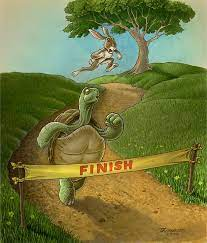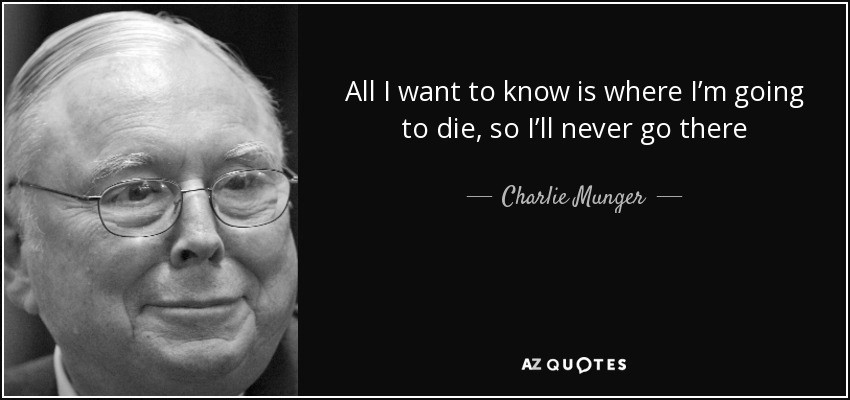Charlie Munger delivered a graduation speech at the Harvard School in 1986. During his talk, Charlie shared how to guarantee a life of misery.
Expanding on a talk Johnny Carson had done before titled, ‘Prescriptions for Misery,’ Charlie added a few twists of his own. ”After all, I am much older than Carson was when he spoke and have failed and been miserable more often and, in more ways, than was possible for a charming humorist speaking at younger age,” Charlie said.

Charlie expanded on Johnny Carson’s 3 prescriptions for misery and added 4 more prescriptions of his own for a total of 7 prescriptions.
These are the 7 prescriptions to guarantee a life of misery:
- Ingesting chemicals in an effort to alter mood or perception
- Envy
- Resentment
- Be unreliable
- Learn everything you can from own experience, minimize what you learn vicariously from the good and bad experience of others – living and dead
- To go down and stay down when you get your first, second, or third severe reverse in the battle of life
- To ignore a story told by a rustic who said: ‘I wish I know where I was going to die, and then I’d never go there’
A deep dive into each prescription:
- Ingesting chemicals in an effort to alter mood or perception
This topic was discussed around the concept of addiction. ‘Addiction can happen to any of us through a subtle process where the bonds of degradation are too light to be felt until they are too strong to be broken.’
Charlie shared his four closest friends of his youth were intelligent, ethical, humorous types. Favored in person and background. But two are dead with alcohol as a contributing factor. And a third is a living alcoholic (if one can call it living).
2. Envy
Envy is an emotion we can feel when others get something in their lives that we may not have. Success, better job, better spouse, more money, status, etc.
In the bible, the first murder has its roots deeply embedded within envy. Cain envied that Abel’s offerings were favored by God. Cain then went on to murder Abel.
A simple emotion enough to drive temporary insanity to take the life of his own brother.
Robert Greene advised, “Be warned against people who harbor envy against us. As these people are dangerous and we ought to be aware of these people.”
Charlie Munger on envy:
‘The world is not driven by greed; it’s driven by envy.’
“Here’s one truth that perhaps your typical investment counsellor would disagree with: if you’re comfortably rich and someone else is getting richer faster than you by, for example, investing in risky stocks, so what?! Someone will always be getting richer faster than you. This is not a tragedy.”
“I think envy is one of the major problems of the human condition, and that’s why it figured so prominently in the laws of Moses. Remember, he said you couldn’t even covet your neighbor’s donkey.”
3. Resentment
‘Life is hard enough to swallow without squeezing in the bitter rind of resentment’ – Samuel Johnson.
In a talk between Robert Greene and Jordan Peterson, Greene mentioned that we have to acknowledge our dark side, which includes anger and resentment. Denying our dark side can only lead to negative consequences. Greene refers to the dark side as a ‘kicking and screaming 2 year old’. Which is an appropriate labeling, considering the amount of energy our dark side generates.
The feeling of resentment generates enough energy to make a person capable of starting a war. This same energy is also enough to drive a person to do something regrettable during moments of temporary insanity.
Greene recommends that we acknowledge our dark side. To find and channel anger towards a moral problem can provide purpose and energy.
On the other hand, Charlie recommends practicing Disraeli Compromise. Benjamin Disraeli became the Prime Minister of the United Kingdom, and when he rose to become one of the greatest Prime Minister, he had to learn to give up vengeance as his motivation for action.
He did retain outlet for resentment by putting the names of people who wronged him on pieces of paper in a drawer. Then, from time to time, he reviewed these names and took pleasure in noting the way the world had taken his enemies down without his assistance.
4. Be unreliable
“If you will only master this one habit you will more than counterbalance the combined effect of all your virtues, howsoever great.” There is a reason why this is the number one habit that Charlie recommends on his expansion series of prescription on how to guarantee misery.
The upside of being reliable: Charlie told a story of his college roommate who was severely dyslexic. Major life disadvantage. Charlie then said, what works for him is he is the most reliable person that Charlie has ever known. Fast forward years later, Charlie said, ‘He has had a wonderful life so far, outstanding wife and children, chief executive of a multibillion-dollar corporation.’
Another example that Charlie gave is a man who mastered the work of his best predecessors, despite a poor start and very tough time in analytic geometry. By being reliable in showing up for his work, eventually his work attracted wide attention. The man is Sir Isaac Newton.
On being unreliable: If you like being distrusted and excluded from the best human contribution and company, this prescription is for you. Master this one habit and you can always play the role of the hare in the fable, except that instead of being outrun by one fine turtle you will be outrun by hordes and hordes of mediocre turtles and even by some mediocre turtles on crutches.

5. Learn everything you can from own experience, minimize what you learn vicariously from the good and bad experience of others – living and dead
This prescription is a sure-shot producer of misery and second-rate achievement.
When one ignores and does not learn from the good and the bad experience of others (both living and dead), it is the ego taunting on life and mortality.
The person assumes that life is long enough that he/she can afford to experience everything firsthand and learn from it. This person also assumes that all bad experiences would not damage them permanently and they can bounce back off of them. When in reality, a single bad experience can permanently put a person down.
On the benefits of learning vicariously from others: referring to the story of Sir Isaac Newton above, he credited his work to those who have laid the groundwork before him. “If I have seen a little farther than other men it is because I stood on the shoulders of giants.” If one hopes to avoid misery and to see a little farther than others, it is prudent to learn vicariously from the good and bad experience of others.
6. To go down and stay down when you get your first, second, or third severe reverse in the battle of life
Charlie mentioned that even for the lucky and the wise, in the battle of life, there is much adversity.
To go down and stay down is a prescription to be permanently mired in misery.
This prescription touches on the resilience, perseverance, and grit.
To go through life without any resilience, perseverance, and grit is to go through life being easily pushed over and being quick to give up when faced with adversity.
It highlights the lack of resourcefulness to figure out a problem.
Jeff Bezos and his wife (at the time) let their four kids play with knives at age 4 and power tools at age 7. They said that they, ‘would much rather have a kid with nine fingers than a resourceless kid.’

7. To ignore a story told by a rustic who said: ‘I wish I know where I was going to die, and then I’d never go there’
Charlie mentioned that in order to help fail and live in misery, people should discount the wisdom as mere quirk, with no useful message.
When in reality, the message here is to ‘Invert, Always Invert’ – Jacobi.
Many hard problems are best solved only when they are addressed backwards. By inverting, it also helps those who are looking to solve the problem to increase objectivity.
When one minimizes objectivity, he/she would ignore lessons from Einstein and Darwin of testing and destructing own ideas. In essence, he/she would create an echo chamber of potentially false ideas.
The topic of inverting is widely covered here: Invert, Always Invert – Ongky.com
“A lot of success in life and business comes from knowing what you want to avoid: early death, a bad marriage, etc.” – Charlie Munger
